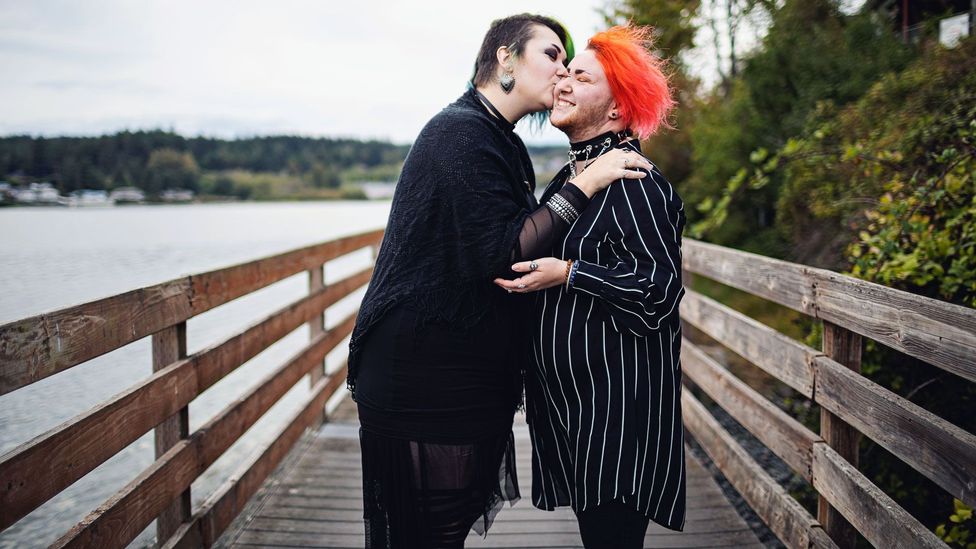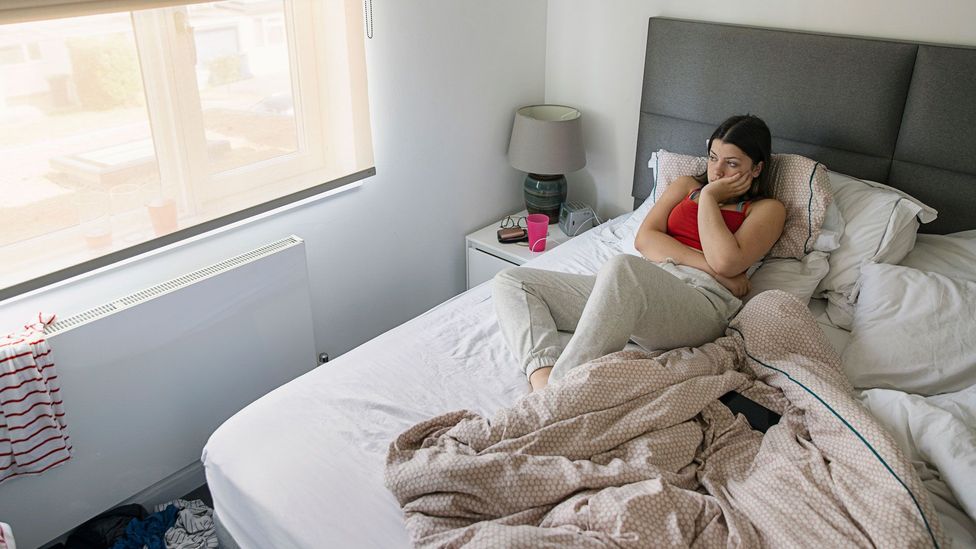The ways we think about sex and love are always evolving, constantly influenced by cultural, political and global happenings.
This year was no different. Much of that influence particularly spread online, especially in communities by and for those who identify across the LGBTQIA+ spectrum. Meanwhile, ripple effects from the self-reflection undertaken throughout the Covid-19 pandemic continued to rock the wider dating world, resulting in more intentional practices. People thought more about who they wanted to date, and how they wanted to do it.
In 2022, this meant more folks openly moved away from both gender and attraction binaries. We saw people rely even more on the internet to find potential partners, for better and for worse. And daters got increasingly vocal about exploring different types of relationships, from solo polyamory to platonic life partnerships.
People are moving away from long-held binaries
In Western culture, relationships, gender and sexuality have long been defined by binaries. Either a couple is dating or they’re not; a person is attracted to women or men; a person is either a woman or man. Throughout the past several years, however, these binaries have grown steadily less entrenched, as more people are looking at sexual orientations and gender identities in different ways. And this was especially pronounced in 2022.
As far as sexual orientation, a person’s gender has become less relevant for many people when looking for a partner; this is especially the case for many millennials and Gen Zers navigating intimate relationships. For some, it’s even ended up at the “bottom of the list” in terms of what they desire in a partner. That’s particularly true for people who identify as queer or pansexual, meaning their romantic and/or sexual attractions don’t hinge on gender.
As 23-year-old, London-based Ella Deregowska put it, identifying as pansexual has allowed her to “fluidly move and accept each attraction I feel without feeling like I need to reconsider my identity or label in order to explain it”. Experts say the increased openness towards non-binary attractions, in part, is linked to increased representation in popular media – from television shows such as Canada’s Schitt’s Creek, in which Dan Levy plays the pansexual David Rose, to celebrities like Janelle Monae, who’ve identified with pansexuality.
It’s not just sexual orientation that’s felt a shift from binaries this year. More young folk (and celebrities) have also moved away from binaries to describe their gender. Identifying as non-binary or gender fluid lets many people express themselves more genuinely, since that expression may not inhabit one black-or-white category. “One day I wake up and feel more feminine, and maybe I want to wear a crop top and put earrings on. And then there’s times in which I’m like, I need my [chest] binder [to minimise the appearance of my breasts],” says Barcelona-based Carla Hernando, 26.
Even with more people breaking down sexual and gender binaries, however, dating can still be a minefield for those who identify as non-binary. From dating apps enforcing gender binaries, to partners pushing non-binary daters into gendered roles, not all parts of society have caught up with the movement away from binary gender norms.

In 2022, binaries grew less entrenched, as more people looked at sexual orientations and gender (Credit: Getty)
We’re increasingly challenging relationship taboos and traditions
Relationships among young daters have increasingly bucked entrenched norms this year.
Gen Z is has particularly embraced the grey area of dating by purposefully entering into ‘situationships’. These connections satisfy needs for close companionship, intimacy and sex, but don’t necessarily hinge on long-term relationship goals – instead existing somewhere between a relationship and a casual hook-up. Per Elizabeth Armstrong, a sociology professor at the University of Michigan, US, who studies these types of relationships, Gen Zers feel that “the situationship, for whatever reason, works for right now. And for right now, ‘I'm not going to worry about having a thing that is ‘going somewhere’”.
Overall, openness towards many kinds of non-traditional relationships has gained visibility, too. Ethical non-monogamy has been all over TikTok, often in the form of polyamorous relationships, in which more than two committed romantic and sexual partners cohabit. Then there are open relationships, which can look like anything from partners who hook up with other couples together, to those who have separate relationships with others outside their primary partnership. There are also poly people who prefer to live solo, embracing a ‘solo polyamorous’ lifestyle, through which they live alone but engage in multiple, committed relationships. Others to choose to cohabit with platonic partners, forming lasting relationships and even buying homes and planning futures with close friends rather than lovers.
Yet despite all this, plenty of relationship taboos and myths have endured, and likely will continue to. Single shaming, for instance, has been going strong since the start of the pandemic, when a survey by dating service Match showed 52% of UK-based single adults had experienced shaming for their (lack of) relationship status. And people still judge Leonardo DiCaprio and friends for their wide age-gap relationships. Meanwhile, myths like the idea of ‘opposites attracting’ endure, even though they often don’t.

Splitting became both easier and harder in 2022; divorce coaches thrived even as finances trapped couples together (Credit: Getty)
Breaking up is hard to do – and Covid-19 and the economy make it harder
The increased comfort around different ways to date hasn’t made break-ups any easier. Plenty of couples who blossomed under Covid-19 restrictions felt this acutely in 2022 – having started dating in ‘couple bubbles’ during lockdowns, many are struggling to adapt to relationships under more normal conditions. Some couples who thrive in solitude, it turns out, don’t cut it in the real world.
Yet in 2022, we’ve seen solutions for couples teetering on the edge of a break-up. “Life-changing” divorce coaches can help married couples navigate the mental health struggles of their break-ups, from the UK to Canada. These coaches represent a shift towards the normalisation of both seeking therapeutic aid in times of great stress, and of divorce overall. “It is no longer seen as a flaw of character, or a failure in one’s own life to divorce,” says Yasmine Saad, a clinical psychologist and founder of Madison Park Psychological Services in New York City. Hiring a divorce coach, therefore, is as natural as “wanting financial advice before investing your money”.
Or, couples who want to go the distance can try a gap year – an extended break that doesn’t signify the end of their relationships. Relationship therapists report seeing more of this in the wake of the pandemic, as couples who felt cooped up together over the last couple years want to explore life solo without breaking up.
Yet for couples set on splitting, the latest economic downtown has trapped some in joint living situations. Living alone these days, after all, isn’t cheap, and neither is buying an ex-partner out of their share of a joint dwelling. As Chantal Tucker, 37, who co-owns a London property with her ex-partner, put it, “I knew that I would never be able to afford to buy property again, and the prospect of renting in London forever was increasingly unpleasant.”

Some millennials struggled with 'dead bedrooms' in 2022 (Credit: Getty)
People are trying to make the increasingly bleak world of dating better
For those who are single, meanwhile, navigating the treacherous waters of dating apps has still been hard.
It’s undeniable that dating apps have become the primary way for younger daters (millennials and Gen Z) to meet, with thousands of online dating sites in existence and 48% of 18 to 29-year-olds in the US using them. Unfortunately, bad behaviour on these apps is abundant, ranging from people using them to engage in infidelity or even harassment, the brunt of which female-identified users receive. It’s no wonder many people have become totally burnt out on online dating. Daters of all genders report being overwhelmed by the choices available on dating apps, saying it feels more like playing a numbers game than engaging with real potential partners.
“I feel burnt out sometimes when I feel like I have to swipe through literally 100 people to find someone who I think is moderately interesting,” says Philadelphia, US-based Rosemary Guiser, 32, but it’s almost impossible to avoid using apps to meet someone. “You could compare [their supremacy] a little bit to Amazon or Facebook,” says Nora Padison, a licensed graduate professional counsellor in Baltimore, US.
But because of the pandemic, people have become used to meeting online as an initial encounter. That pre-screening, for many, has been viewed as a safer, smarter way to decide to go on a real-life date, and it’s still the way many singles are engaging in more “intentional” dating. Another way is by doing it sober. A 2022 trends survey by dating service Bumble showed 34% of UK users were more likely to go on sober dates since the start of the pandemic, and 62% said they’d be more apt to form “genuine connections” when doing so.
Some bedrooms are ‘dead’, while others are booming
While the pandemic gave people time to explore and even reconsider their sexualities, it also definitely took a toll on people’s sex lives, specifically millennial couples. Data from 2021 shows US-based, married millennials reporting the most problems with sexual desire that year, often attributed to exhaustion from heavy workloads, mental health issues and financial stressors.
This year, we learned millennial couples seem to be arriving at sexless relationships faster than their older counterparts – as San Francisco, US-based sex therapist Celeste Hirschman noticed, it used to take her coupled clients around 10 to 15 years to stop having sex with each other. “Now, it’s maybe taking three to five,” she says.
But while many married millennials have struggled with sexless marriages, Baby Boomers may be having the best sex of their lives – their experience and patience having resulted in more bedroom skills and better communication. Gen Z – who have a reputation for not having sex enough – are really just engaging in it more pragmatically. Their focus isn’t on settling down for the sake of it, but on getting their own lives together before bringing in a committed partner or thinking about starting a family.
Regardless of the type of sex anyone is having, there’s good news. Embracing a positive, growth mindset can make your sex life better. New Year’s resolution, anyone?
"Love" - Google News
December 21, 2022 at 04:03AM
https://ift.tt/lzwfA04
Love and sex in 2022: The five biggest lessons of the year - BBC
"Love" - Google News
https://ift.tt/TQ3z7qd
https://ift.tt/0KcXuVQ
Bagikan Berita Ini














0 Response to "Love and sex in 2022: The five biggest lessons of the year - BBC"
Post a Comment